To read this issue in your browser, click on the headline above.
Eric Zorn is a former opinion columnist for the Chicago Tribune. Find a longer bio and contact information here. This issue exceeds in size the maximum length for a standard email. To read the entire issue in your browser, click on the headline link above. Paid subscribers receive each Picayune Plus in their email inbox each Tuesday, are part of our civil and productive commenting community and enjoy the sublime satisfaction of supporting this enterprise.
Tuesdays at 11:30 a.m. I talk with WGN-AM 720 host John Williams about what’s making news and likely to be grist for the PS mill. The WGN listen-live link is here.
Notes and comments from readers — lightly edited — along with my responses
The prosecution (or persecution?) of Donald Trump
Bill Coleman — Given your long history of writing about flaws in the criminal justice system and prosecutorial abuse, I was shocked by your post, “The unpardonable delay in putting Trump on trial stands to thwart forever the administration of justice.”
However much you dislike Donald Trump — and you are partially justified in disliking him — he is every bit as entitled to due process as any other criminal defendant. I know you know that. How can you throw out this basic principle in your eagerness to get Trump? Although Trump as defendant has an absolute right to due process, neither The Democratic Party nor the general public has any right whatsoever to force these trials to take place during the election. In fact, U.S. Department of Justice rules forbid doing so.
All of the various charges have been aired constantly for many months. All available evidence seems to indicate that the public is not impressed. The current case in New York is not a weak case, it is a travesty. It is a rigged set of accusations which do not add up to a crime. The trial has been underway for weeks and the prosecution has yet to reveal the underlying predicate crime necessary to prosecute the case. How can you defend that? How can you defend hiding the identity of witnesses from the defense? How can you defend having a presiding judge who has contributed money to Trump's electoral opponent and whose daughter is fundraising for that opponent based upon the trial?
Am I wrong to think that you would never defend any of these things were the defendant not Donald Trump?
I will say that you are correct to blame the investigators and prosecutors for delaying the charges but you know why they did that: The whole goal was to interfere with the election and, among other things, to keep Trump tied up in court rather than campaigning.
I respectfully suggest that you reconsider your attitude toward this. Destroying Trump may be important but it does not justify destroying the integrity of the legal system.
Beth Bales — The government has been underhanded on the classified documents case. The FBI staged that infamous photo and then put things back in not the same order. I believe the feds have also held back a great deal of evidence and now the defense gets time to go through that evidence. I'm right with you on the immunity case. But I think the hush money case is a travesty, with reasoning the feds have already rejected. Is the hatred of Trump here so severe that absolutely anything goes? Where is the line? What happens when this abuse of discretion is used against someone you support?
Whether Trump is a rapist, fraudster, racist and liar is utterly irrelevant to the facts of the court case on documents. What is relevant? Shenanigans by the justice department, chicanery from the FBI and hiding/misplacing evidence on the part of prosecutors. People should not be convicted because you personally don't like them. Evidence is always an advantage. Playing within the law is mandatory.
Zorn — I don’t know how anyone can consider the evidence in the so-called hush-money trial now in progress and not conclude that the criminal allegations against the former president are serious, and that the evidence is strong that he’s guilty.
Both the above letter writers refer to the current prosecution as a “travesty,” though this alleged crime was committed in the service of skewing the results of the most important election in the world. And the law should look the other way because … Trump should be above the law?
Or because “the public is not impressed” with what little they know of the evidence? Since when do we take public impressions into account when deciding whether to prosecute someone?
Bill Coleman writes that “The Democratic Party nor the general public has any right whatsoever to force these trials to take place during the election. In fact, U.S. Department of Justice rules forbid doing so.” But that Trump talking point is untrue.
CNN fact-checked this claim:
There is no Justice Department rule or regulation that says a candidate can’t be prosecuted during their election campaign, as three former federal prosecutors confirmed to CNN. And even if such a federal policy did exist, Trump would be wrong to say that it applied to local district attorneys or state attorneys general. Those officials are not federal employees and not subject to the Justice Department’s policies for federal prosecutors. … (There is) an unwritten policy against federal prosecutors indicting a candidate or federal law enforcement taking “overt” investigative steps regarding the candidate – such as executing a search warrant or conducting an interview – in close proximity to an Election Day in a party primary or a general election. (It’s often called “the 60-day rule,” though the precise number of days away from an election is not universally agreed upon.) But here’s the key with regard to Trump: The Justice Department has no policy, written or unwritten, forbidding an already-indicted candidate from being put on trial close to an Election Day. While the Justice Department controls the timing of its investigative efforts, it does not control when a trial occurs once someone is indicted.
And I need not point out that Trump and his slavish followers were howling “Lock her up!!!” about Hillary Clinton in the run-up to the 2016 election because of her use of a private email server. I’m stunned, therefore, to read this bleating about photographs of the evidence in the documents case.
Trump had a trove of classified material he should not have had and that he refused to turn over, which is what prompted the raid and now the prosecution. And you’re worried about photographs of the evidence?
My gripe is not with Trump, sleazy crook though he certainly is, but with the prosecutors who dragged their feet on all these cases, and the justices and judges who are drawing out the proceedings until after Election Day. Coleman seems to believe in a (mostly failed) multi-layered conspiracy by prosecutors around the country to try to time their indictments in order to put Trump on trial right before the election. But incompetence and excessive deferential caution seems to be the most logical explanation. Occam’s Razor!
America’s going to go to the polls with the most serious of the felony charges against Trump unlitigated and perhaps never to be resolved. That ought to bother you.
And as for a trial judge with partisan leanings — well, the jury will make the decision in the case, and if the verdict is guilty, all of his rulings will no doubt be reviewed by the appellate courts. Further, partisanship in the judiciary is a concern, I invite you to consider the naked political leaning of the U.S. Supreme Court, where the justices are far, far more powerful than a mere trial judge and are delaying their ruling on Trump’s terrifying presidential immunity claim in a way that will make it impossible to put him on trial in Florida and Georgia before November.
Jake H. — Most of us don't know how good we have it to live in a country that honest to goodness, every day, dispenses justice without fear or favor while respecting the rights of the accused; where an independent judiciary has the actual power — not just in theory but in practice — to put the powers that be to their proof, where actual argument based on actual law and actual evidence actually makes the difference where the rubber meets the road. Speed bumps? Yes. Mistakes? Yes. Imperfect? Obviously. But what I just described is still relatively rare today and, in the broad sweep of history, barely a thing.
The facts of the Trump document case are pretty much undisputed -- he kept presidential documents, including top secret shit, and concealed the fact, even after numerous requests for their return, not only against the law but in outrageous defiance of it. Just like the protesters who persist in camping out on quads after warnings to leave, Trump himself chose to force the issue, and he has no grounds now to complain of persecution. If my guy did the same, I'd have to say, have at him.
Readers favor Ask Eric over Ask Amy
Cate Plys — Oh my God, I don't want to pile on Amy Dickinson, but her advice to the man whose sister-in-law confessed “feelings” for him — “Tell your wife what happened. … Your honesty about this will kickstart some awkwardness, but you should refuse to be a party to any subsequent drama” — was the worst advice I've ever seen. Honesty is not always the best policy.
Nancy Meyer — Following Amy's advice would only create pointless discord between sisters, it would legitimize thought policing. The husband and the sister-in-law are responsible only for their deeds, not the idle ramblings of their brains.
Does the husband also confess to his wife every time he imagines snuggling with a pretty screen actress? And does keeping some idle notions to himself somehow violate their marital intimacy?
Come to think of it, though, I have to wonder if the main reason the husband even considered telling his wife of his sister-in-law's admission was to insure that he didn't act on the stimulating new possibility. Torpedoing the sisters' relationship with his wife would guarantee that his wife would keep such close tabs on both parties that he would be relieved of having to resist temptation himself, and he would look like the good guy by scoring honesty points.
Peter Zackrison — Play this out. Husband tells wife, wife confronts sister-in-law, sister-in-law says “I never said anything of the sort, and by the way he has been subtly hitting on me these many years!” Wife believes her sister over her husband. Marriage begins to unravel. Divorce. Husband finds solace in the arms of the sister-in-law. Her dastardly plan has worked!
What I’m saying is, once this indiscreet near-proposition is raised, no one has any idea of the outcome. But all the outcomes look bad. So forgetting about the issue is not only the best solution, it is the only solution.
Ira Pilchen — I never write to Dear Amy, but I did immediately after reading this column a few days ago to express my horrified disagreement with her advice.
David Leitschuh — I find myself in disagreement with you on this one Eric. I strongly believe the husband has an absolute obligation to tell his wife that her sister hit on him. To do otherwise is to violate marital intellectual and emotional intimacy.
While there indeed would undoubtedly follow a family conflagration between his wife and her sister, simply ask yourself this question: How would you feel if your wife had been hit on by one of your relaties and she didn’t tell you about it? I daresay that the overwhelming majority of people would want to know and that would be the right thing to do, despite the consequences which entirely flow from the sister-in-law's actions, not the husband sharing this information with his wife.
Michael M. — I think what might be going on here, given how long the sister has had feelings for her brother-in-law, is that she hopes that voicing her feelings for him openly will allow her to move on. And didn't you and Amy have a tiff on Twitter and she blocked you?
Zorn — I like Amy Dickinson both personally and professionally. We were colleagues at the Tribune for many years and she’s a delightful person who usually gives very thoughtful advice. But yes, “My Twitter spat with Ask Amy” in 2022 caused her to block me.
In the column I took issue with then, she wrote, “I believe in anyone’s right to hold their vaccination status privately, and I have guarded my own.”
I wrote:
We’re in a public health crisis, and your vaccine status not only tells us about the likelihood that you’re infected and contagious (not zero, of course!), but also how seriously you take the social obligation to do what you can to protect others from the raging pandemic. Framing the vaccination question as a matter of medical privacy plays right into the hands of the vax resistant who have been and still are making the problem worse. Asking someone if they’re vaccinated is no more intrusive than asking them if they wear a seat belt when they drive or if they keep their deadly weapons, if any, out of the reach of children. Telling others that you’ve been vaccinated reinforces an important public health message.
I posted a click poll then:
Similarly, I posted a click poll last week asking if P.S. readers favored Amy’s advice to tell his wife what her sister had said to him, or my advice, which was “Memory-hole the entire awkward, one-time exchange. Pretend it didn’t happen and never speak of it again.”
Should Chicago lower its speed limits?
Conor McNamara — In response to the skeptical comments you have made and that you and the other Mincing Rascals offered on the May 8 podcast about the idea of lowering the default speed limit in Chicago to 25 mph:
A 20 mph limit has been the line for much of the rest of the world. 20's Plenty is an organization based in the UK that advocates for 20 mph. Their website has loads of good info on the topic. Minneapolis has also lowered their default speed limit to 20. Here are a few other useful links:
So you wanted to see more evidence? There is it. This idea has been implemented in many places around the world without much issue.
Next, it’s worth noting, the average speed of vehicles in the city of Chicago is only about 24mph. Lights, traffic, stop signs, pedestrians, etc. all work together to keep cars from moving all that fast throughout the city. People go 30 between lights, so they feel they are moving quickly, but the light really slows down that average speed. Lights are also timed around speed limits, so going over the limit doesn’t save you much time. Just because you are moving quickly between lights doesn’t actually mean you are making good time. I also think it’s worth considering how much of that average 24 mph made up at night and in outer neighborhoods. If, during the day, the average speed of cars on city streets is only 19 mph, then why the fuss on the 20? Especially if it is going to save lives. (Not just lives! We always focus on the lives lost to cars but completely disregard how many people enter into medical debt or become disabled due to car crashes!)
I think you’ll find, if you accept the challenge, that commonly held assumptions and beliefs about cars, urban spaces, how we move, etc are, more or less, bullshit. There is much research on the downsides of cars. Once you start looking you will quickly become overwhelmed. “The High Cost of Free Parking” by Donal Schoup is an 800 page book by an economist on how destructive free parking is. Not all parking, just free parking. Read “Traffication” and see how bad cars are for the environment. The book doesn’t even go into their carbon footprint, just secondary pollutants. Check out how much money we spend on roads and suburbanization, or the “Growth Ponzi Scheme” at the Strong Towns site and see what we are missing by designing around cars. How it makes us unhealthy, lonely, and angry.
When people think of a world with fewer cars they think of traffic mayhem, stranded disabled people, 10-mile walks to grocery stores… They think of all the negatives but never of the positives. I believe that, if you accept, you will come away with a new way of seeing things.
Deni — Commute times and congestion would not increase if Chicago lowered its speed limits. In an urban environment there is very little difference between 25 and 30 mph, you mainly end up hitting the same red lights, and congestion is not caused by the posted speed limits, it is caused by too many cars on the streets.
Maybe hop on a bike or take transit sometime to see what it's like out there on the streets. Traffic deaths are on the rise in Chicago and you come out against everything that tries to solve that problem. You seem to give almost every topic you comment on serious thought and consideration, except this one. It's disappointing.
Marc Martinez — The arguments in favor of lowering the speed limits to make the streets safer seem to ignore causes. How many drivers were impaired? How many were exceeding the speed limit and by how much? How many of these mishaps occurred in low-speed maneuvers such as turning? How many of the drivers were distracted? How many were breaking other laws, such as driving the wrong way on a one-way street or running a stop sign? My guess is that lowering the speed limit will just increase the percentage of drivers who are cited for speeding.
Tom Krish —I'm so confused. After the killing of Dexter Reed who was pulled over for an alleged seat belt violation, the solution is for police to stop more drivers for minor infractions?
Zorn — I have no doubt that every mile by which a city can drop speed limits, lives will be saved and crashes avoided. Drop the limit to 10 mph on residential streets, as Mayor Brandon Johnson’s transition plan proposed, and even more lives would be saved. Increase it to 40 mph and more people would die. It’s physics.
I am open to robust discussion of all the considerations we might make in drawing this line, including the envisioned enforcement mechanisms. The “eat your spinach!” vibe from anti-car folks here is not going to move public opinion, especially when the CTA is so troubled that some 20 alders are calling for the ouster of agency chief Dorval Carter.
I’m not a speeder, and I’ve been trying out driving at the lower suggested limit on various trips — to the consternation of those behind me — and it is slightly lengthening my trips. But this may be because lights are timed to reflect the higher limit or other factors.
Israel, Gaza and the campus protests
Joanie Wimmer — Shortly after Hamas’ Oct. 7th attack on Israel, Israeli Defense Minister Yoav Gallant said, “I have ordered a complete siege on the Gaza Strip. There will be no electricity, no food, no fuel, everything is closed. We are fighting human animals and we are acting accordingly.”
The Palestinians are not animals. They are people. And I think most of the protestors want an acknowledgement of that, and they want the Israeli government to act accordingly, and not to slaughter innocent Palestinian women and children, which the Israeli government has been doing. I favor a two-state solution. People need to learn how to live in peace. Killing begets more killing, always in the name of right and honor.
Jay G. — Hamas' use of civilians as human shields is despicable, as is Hamas' overt, ultimate aim of annihilating Israel. Israel's overreaction is what most college protesters are objecting to. In the last week I've seen some very disturbing video of pro-Palestinian protesters not merely "peacefully protesting,” but outright preventing their fellow students from accessing parts of campus. (And college security personnel - apparently with administration consent - allowing such things to occur.) I am fairly absolutist on free speech and protesting, but when the protesting morphs into illegal action (and I do not count peaceful trespassing which does not inhibit others as illegal action), that's where I draw the line.
David Leitschuh — It appears very incongruent to me that a single penny of American tax dollars is going into Gaza as aid before the hostages who are American citizens — Hersch Goldberg-Polin and Keith Siegel, for example — are released and returned. And there is no real bifurcation between Hamas and the Palestinian population in Gaza, as polls have consistently shown a very high level of Palestinian support for Hamas, a disgusting strong majority approval of the Oct.7 attacks, and a strong majority opposition to a two-state peace with Israel. So please do not defend American aid going to the civilian population because they are deemed to be captive to Hamas — that is not at all the truth.
Can anyone explain to me why there isn’t outrage across the political spectrum about the plight of our American citizens being held by terrorists who are being ignored by our government and media?
Laurence E Siegel — I'm not even sure just what the campus encampment protests are really about. Opposition to Israeli oppression? Opposition to any support for Israel whatsoever, or to Israels’ very existence? Are they promoting support for Hamas and its tactics?
Zorn — Hamas has exhibited depraved indifference to human life and human suffering, not only in the Oct. 7 attacks on civilians but also in how they hide among and under their own civilian population, dramatically increasing the civilian casualty count. But of course the people under constant bombardment in Gaza are supporting those who are ostensibly fighting on their behalf, even though I believe that Hamas sees them as pawns in a broad and increasingly successful effort to discredit and marginalize Israel.
If Hamas wanted peace and a two-state solution, releasing the hostages would be a positive step, but their goal is to reclaim Israel “from the river to the sea.” Is that the long-term goal of the protesters and their efforts to get their universities to divest from Israel? Or is it a two-state solution? Or is it just a cease fire and return to the shaky status quo prior to Oct. 7?
Why isn’t their widespread outrage over U.S. citizens who are being held captive by Hamas? My guess is that daily news of the carnage and death from Gaza makes the plight of hostages seem less important, and that Goldberg-Polin and Siegel — mentioned above — weren’t tourists or diplomatic employees but expats who had lived in Israel for many years.
Why isn’t the Saturday newspaper the biggest paper of the week?
Last week I suggested, again, that the Tribune and Sun-Times make the Saturday newspaper the main weekend edition, rather than the traditional fat Sunday newspaper. And I wondered why the bosses had not followed through on that suggestion when I floated it in 2001. In response I heard from a former Tribune executive with this explanation:
It was a business issue at the time. The Saturday paper was easily the second most profitable issue of the week, thanks to classified ads.
(1) The Saturday revenue from the Home Guide was huge, and separate from the ads in Sunday’s Real Estate section (though an advertiser could buy both).
(2) The Auto Mart section was huge, and dealers needed to reach subscribers in the Saturday paper because of the ban on Sunday car sales. And then the revenue for all those ads was increased because many of them also ran in the Transportation section on Sunday.
(3) From a reader time-spent perspective, there was a big paper on Saturday — the bulldog edition of the Sunday paper that went on sale Saturday before noon and sold hundreds of thousands of copies. And in addition to all that classified, the bulldog edition was full of coupons and free-standing inserts. You’d rather have single-copy sales of that than of the Saturday issue anyway.
Needless to say, the facts on the ground are different today.
Are the No No Sox now the Go Go Sox?
Bob E. — Prior to Sunday's game, the White Sox were 9-6 in their most recent 15 games and had the then-longest current winning streak in Major League Baseball. When they were 3-22 I thought they had a lock on becoming the WOAT [worst of all time] and was appreciating your weekly updates comparing them to history’s biggest losers at similar stages. Now I'm thinking this team might win up to 65 games.
Zorn — Yes, sadly the Sox have shown signs of life of late despite a loss Sunday, and their bid for ignominy — which would have been the only interesting thing about the team this season — is appearing ill-fated. They’re lousy, but, like last year’s Oakland A’s — who started out so dismally but finished at 50-112 — probably not interestingly lousy.
After Monday’s Sox rainout and the Florida Marlins’ loss to the Tigers, the 11-32 Marlins are now underperforming the 12-29 Sox.
I’ll keep an eye on the race to the bottom as long as there’s a chance.
Ya gotta see these tweets!
Here are some funny visual images I've come across recently on social media. Enjoy, then evaluate:
Vote for your favorite. I’ll share the winner in Thursday’s main edition.
Usage note: To me, “tweet” has become a generic term for a short post on social media. And I will continue to call the platform Twitter if only to spite Elon Musk:
There’s still time to vote in the conventional Tweet of the Week poll!
Thank you for supporting the Picayune Sentinel. To help this publication grow, please consider spreading the word to friends, family, associates, neighbors and agreeable strangers.
Contact
You can email me here:
I read all the messages that come in, but I do most of my interacting with readers in the comments section beneath each issue.
Some of those letters I reprint and respond to in the Z-mail section of Tuesday’s Picayune Plus, which is delivered to paid subscribers and available to all readers later Tuesday. Check there for responses.
If you don’t want me to use the full name on your email or your comments, let me know how you’d like to be identified.






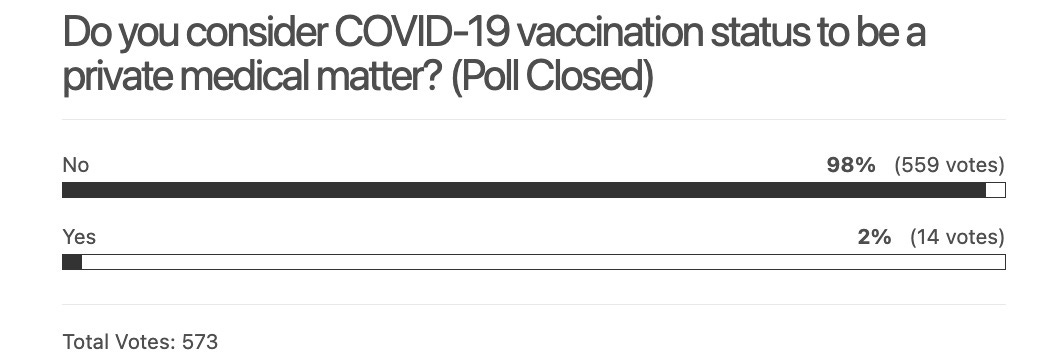
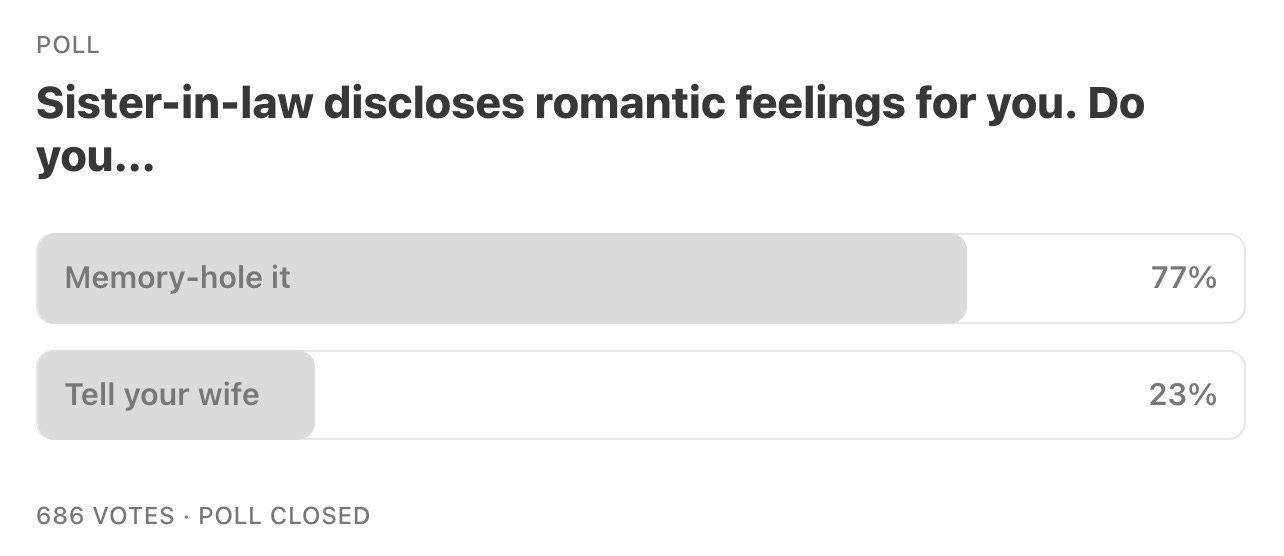



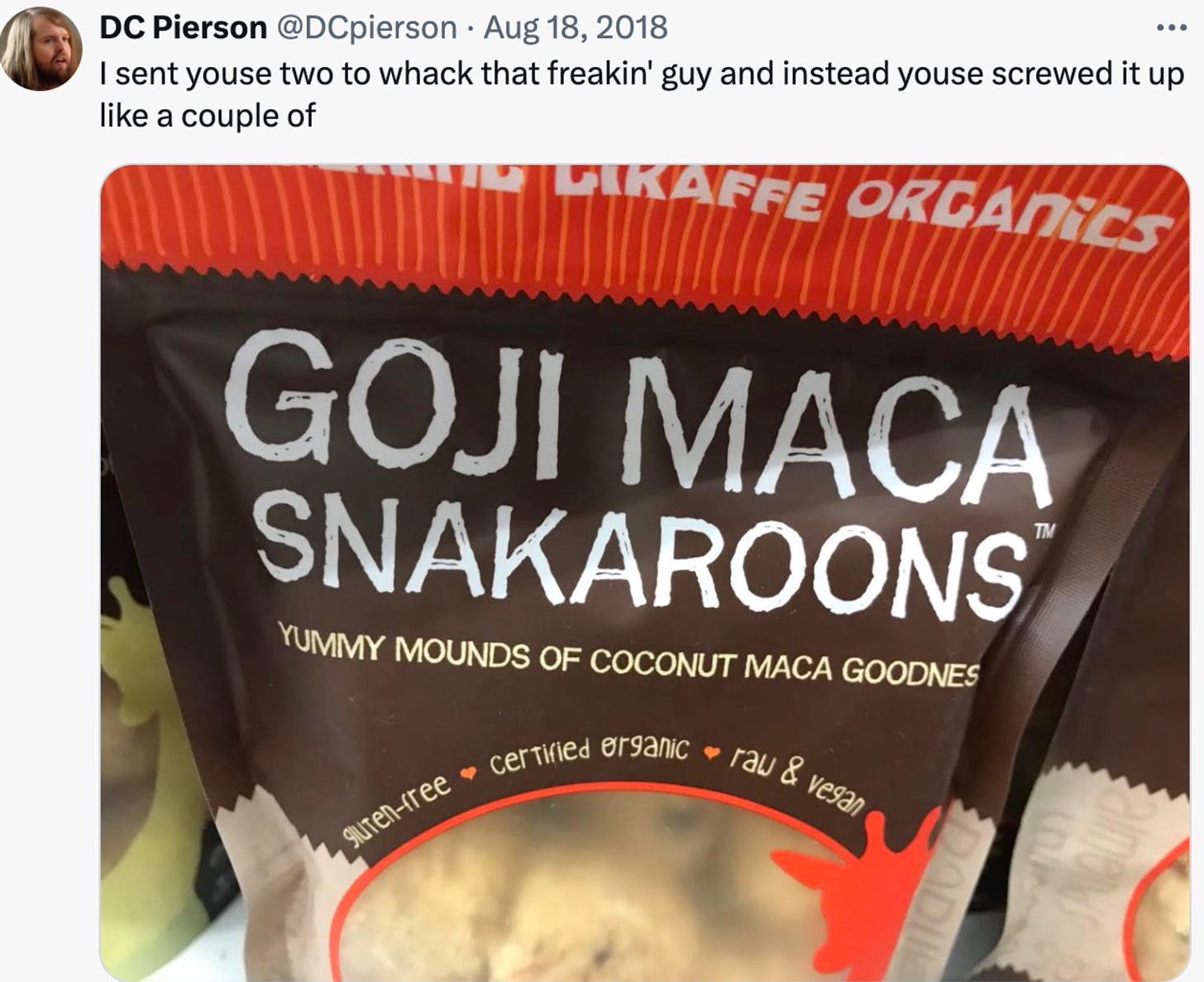
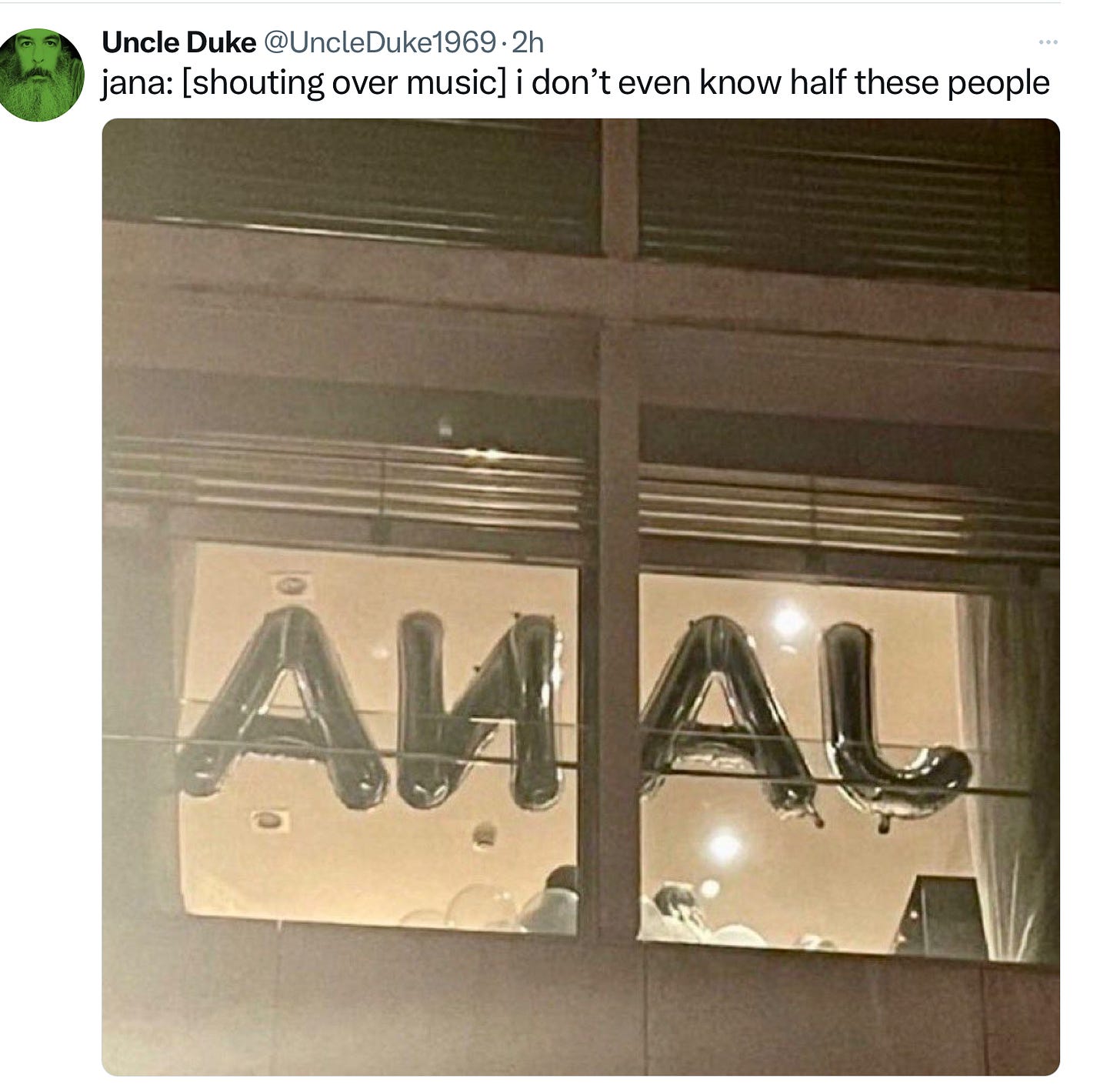
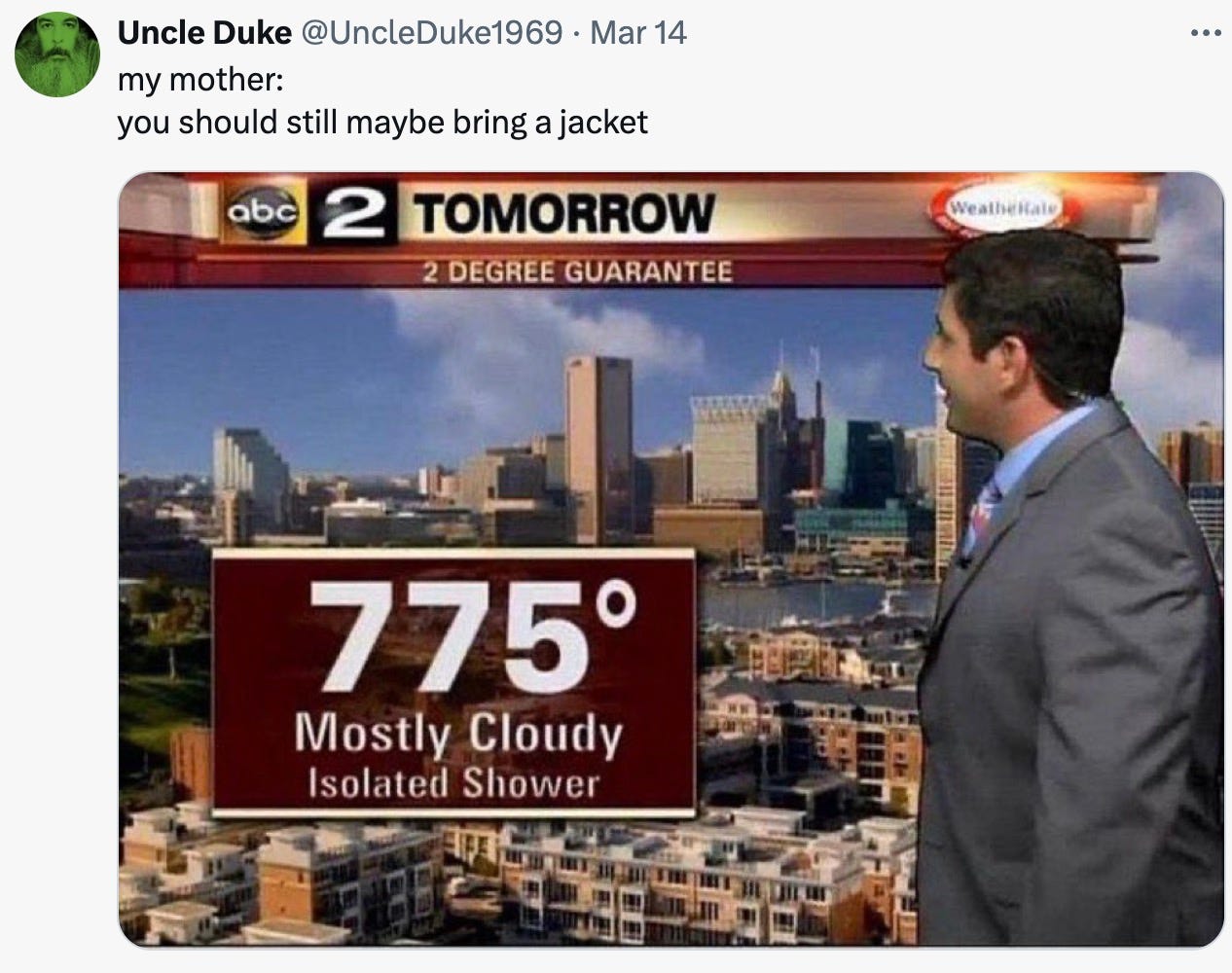


Uncle Duke continues to rule.
Because of his billions and former status as president, Trump has recieved more due process and judicial consideration than any other defendent, ever, all the way up to the Supreme Court. I'm surprised his constant claims of victimhood sway the saner members of the public, including some commenters here.